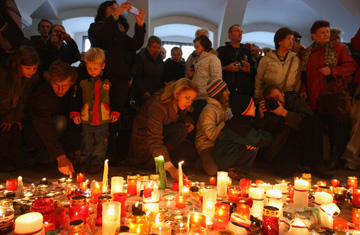
TV producers from the Czech Republic and Slovakia are working together to create cheaper shows with wider appeal
Seventeen years after Czechoslovakia separated into two countries, Czechs and Slovaks are reuniting again — on television. As one of the few positive outcomes of the global financial crisis, TV stations in the two countries have been joining forces to produce lavish talent contests, drama series and one-off entertainment shows in a bid to cut costs and make their fare more attractive to viewers on both sides of the split.
The Czech Republic and Slovakia have stayed amicable since their divorce in 1993, and have spent the past two decades building on their own separate identities. But when two TV stations from different sides of the border decided to work together on a singing contest last fall, they wanted to remind their two countries just how alike they really are.
With Czecho-Slovak SuperStar, Europe's first international version of Pop Idol (the European equivalent of American Idol), the Czech Republic's TV Nova and Slovakia's TV Markiza — both market leaders in their own territories — downplayed national rivalries and represented both countries equally. "We tried to say that this is not a national contest, where two nations fight each other," Nova's CEO, Petr Dvorak, tells TIME. "This was neither hockey nor football." The feel-good approach grabbed audiences, hooking in both teenagers and their parents, who were born in the former federation. At a Prague concert by the show's top 12 contestants in January, some of the older fans couldn't help feeling a touch of nostalgia. "This contest brought us together again," said accountant Martina Cervena, 36, who was chaperoning some of her family's tweens to the show. "It felt good to see how those kids hugged each other on the stage."
Czecho-Slovak SuperStar was not the only cross-border production that season: Barrandov TV, a small Czech station, and TV Joj, a Slovak broadcaster, ran the first season of The Convicted, a drama series set in a women's prison. But it was the singing contest that kicked off a Czechoslovak TV show frenzy. The public stations put on joint New Year's Eve and beauty contest shows, then The Convicted returned with the second season in April. Stations from both countries are also currently filming a series in which Czech and Slovak cops chase criminals together. And two competing talent contest extravaganzas are planned for this fall — TV Joj and the Czech station Prima TV won the license for a joint Got Talent, while the Czecho-Slovak SuperStar collaborators are striking back with their own Talentmania.
Andrea Gavacova, a regional manager at Fremantlemedia, the firm that licenses Idol and Got Talent, is convinced that the joint shows are not just a fad. "The path is irreversible," she tells TIME. "It is advantageous in all respects." Gavacova says she presented proposals for Czechoslovak shows back in 2008, but TV execs rejected them. That all changed only a year later, when the region's TV advertising market was hit by a slump. When Central European Media Enterprises, which owns TV Nova and TV Markiza (and in which TIME's parent company, Time Warner, owns a stake), released its results last year, they showed that TV ad spending in the region shrank by 30%, or $800 million, in 2009 compared to the previous year. TV managers say they quickly realized that joint productions cost each station 30-to-50% less to make. Pointing to last year's lavish New Year's Eve co-production, Czech Television spokesman Ladislav Sticha says, "We would not have been able to afford it on our own.
Slovak Foreign Minister Miroslav Lajcak believes that this kind of cooperation is only possible thanks to the civilized way in which the Czech Republic and Slovakia ended their almost 75-year marriage. "Before we separated we cleared our tables," he said in an email. "No great feelings of injustice were left behind." But relations between the two countries have not always been so idyllic. Before their economic woes pushed them to work with the Slovaks, Czech TV stations almost never broadcast shows in the Slovak language. This lead to a vicious circle: because they weren't exposed to Slovak in the media, Czech children had problems understanding the neighboring tongue. So Czech television managers refused to air shows in Slovak out of fear that young viewers would stop watching. Only five years ago, Czech Television thought it was necessary to dub a drama miniseries shot with Slovak actors into Czech, prompting criticism on the Internet.
Such moves frustrated Slovak activists, with linguists saying that the two languages are so similar, children would have no trouble understanding both — as long as they are exposed to both. Fans of Czecho-Slovak SuperStar are living proof of that argument. Waiting to go in to the concert in January, 17-year-old Denisa Jouzkova said: "It was good that Czechs and Slovaks were together. We picked up some Slovak words." Her friend, Ladislav Dalibaba, nodded in agreement: "It was more lively, more interesting." Born around the time Czechoslovakia became history, the teenagers said they saw no benefits to the split. "I think it was pointless," Jouzkova said. "We would have been bigger if we had stayed together."
Although they have only ever known their homelands as two independent nations, many of the shows stars treat the Czech Republic and Slovakia as one. Martin Chodur, the 20-year-old Czech winner who sounds like a young Tom Jones, moved to the Slovak capital Bratislava to be closer to his manager and musicians, while runner-up Miro Smajda, a baby-faced 21-year-old Slovak rocker with a shock of blond hair, says most of his gigs take place across the Czech border. Speaking to TIME from his Slovak home, Chodur summed up his pragmatic reason for wanting to see the two countries stay united, if only on TV. "Our market is bigger," he says. "And that is always good."
